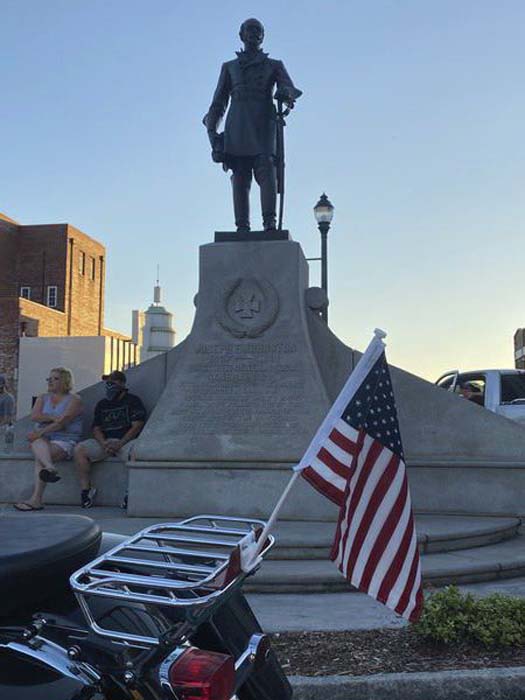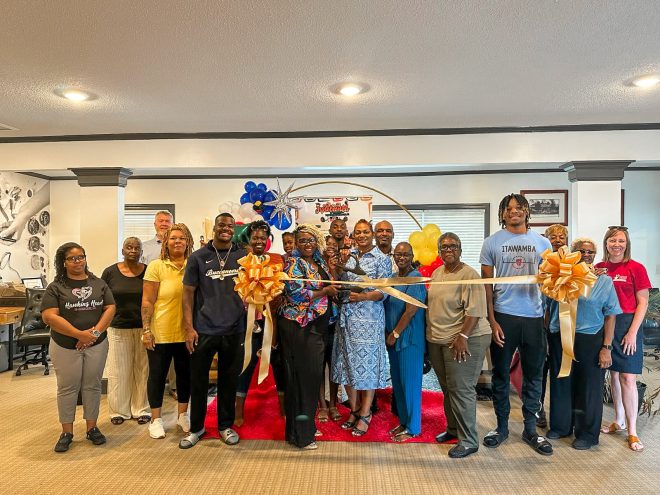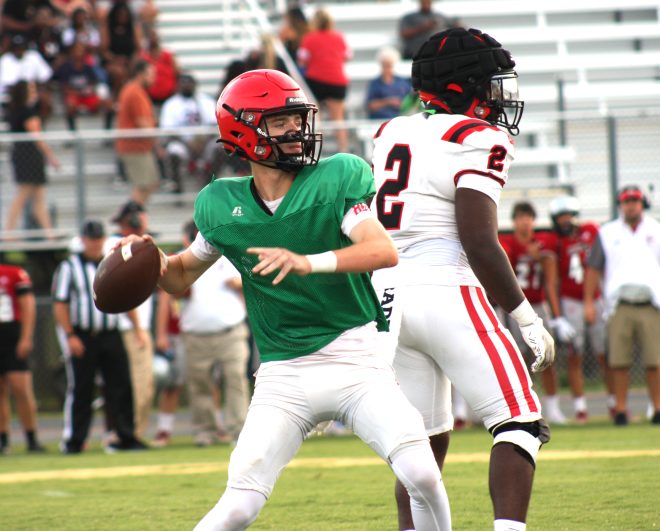Statue owner would agree to move it from downtown Dalton
Published 7:00 am Monday, June 15, 2020

- Jamie Jones/Daily Citizen-NewsThe Gen. Joseph E. Johnston statue in downtown Dalton.
DALTON, Ga. — The Dalton chapter of the United Daughters of the Confederacy (UDC), which owns the statue of Confederate Gen. Joseph E. Johnston in downtown Dalton, says it is “ready and willing to consent to the relocation” of the statue if that is what the Dalton City Council decides, according to Robert Jenkins, the group’s attorney.
The group is “concerned for the safety and security of all parties on each side of this discussion and conflict, and further desiring that there be no conflict among the citizens and visitors of this community, respectfully request that all parties stand down to prevent further disruption, disunity or harm,” according to a press release.
The group’s consent to relocate the statue is contingent on the council or others paying for its “safe relocation,” the press release states. Three City Council members said earlier this week the statue should be moved and two others said they were amenable to the idea.
Confederate statues and symbols have become a flashpoint nationwide as protests, some of which turned violent, have filled numerous cities in the aftermath of the death of Minneapolis resident George Floyd, a black man who died in police custody on May 25. Some Confederate statues have been vandalized, and a man suffered life-threatening injuries Wednesday night in Portsmouth, Virginia, when he was struck by a statue pulled down from a Confederate memorial by protesters.
Approximately 200 people filled the lawn of Dalton City Hall Monday night following a “March for Justice,” and one of the demands of many is the relocation of the statue of Johnston that has been in downtown Dalton at the intersection of Hamilton and Crawford streets since 1912.
A Facebook group called Don’t Let Joe Go that is dedicated to preserving the statue at its current location formed soon after the march on Monday and has more than 6,800 members. During the past few days, people have been standing guard over the statue in fear it may be vandalized.
A march to remember A.L. McCamy, a black man who was lynched and hanged in Dalton in 1936, is planned for Saturday at 6 p.m. in downtown. According to march organizers, attendees will meet at the county-owned parking deck next to the courthouse and will march through downtown and “then towards the statue of Joseph E. Johnston.”
Two protest marches held recently in Dalton have been peaceful. However, the UDC is concerned that heightened emotions from those on both sides of the issue could boil over.
“It has been brought to their attention that further marches, demonstrations and counter-marches and counter-demonstrations are planned which may involve people and parties from each side of this matter, and we are concerned that, in light of the emotional feelings of each side and volatile state of things in our community and in our nation, that someone could get hurt,” the press release said. “It is our prayer that all parties refrain from any further such action. It is our prayer that by allowing the legal process of the local governments and civic organizations to proceed that a good resolution for all parties can result.”
Whitfield County Board of Commissioners Chairman Lynn Laughter said commissioners have offered to the UDC to host the statue at the planned Rocky Face Ridge Park if the city of Dalton decides it should be moved. The ridge is the site of numerous Civil War fortifications, and Grant Farm, at the foot of the ridge on Crow Valley Road, was the site of two Civil War skirmishes and was also the site of Confederate encampments when the Confederate Army of Tennessee spent the winter of 1863-64 in Dalton following the Battle of Chattanooga.
“It would be a good place to have it,” Laughter said. “It would fit in with the other Civil War history.”
Jenkins said the UDC is considering that offer as well as “other options.”
Omar Rodriguez, one of the organizers of last Monday’s march, said it “is really good news that they (the UDC) are willing to compromise and move the statue to a place of more appropriate significance.”
“Our two main places for it to be would be the Civil War park (Rocky Face Ridge Park) or the Huff House,” he said. “Those are places that represent the Civil War and its history and would put (the statue) in context.”
Johnston kept his headquarters in the Huff House when the Army of Tennessee spent the winter of 1863-64 in Dalton. The Huff House is owned by the Whitfield-Murray Historical Society.
Historical society President Ellen Thompson said earlier this week she expects historical society members would be willing to discuss locating the statue at one of their properties if the UDC and the City Council agree to move it. But she said historical society members haven’t discussed that possibility because no one has approached them.
Laughter said the county probably would not agree to paying to relocate the statue.
“Since it is in the city, and the city is dealing with this issue, the city should be more than happy to pay to have it moved,” she said.
Would the city of Dalton pay to relocate the statue if the City Council votes to move it?
City Council members Tyree Goodlett and Annalee Harlan marched with the protesters on Monday and both said the Johnston statue should be relocated.
“It absolutely should be moved,” said Goodlett, the first black City Council member in Dalton history.
Goodlett said Friday the city “probably would” pay to relocate the statue. No dollar figure has been determined as to how much moving the statue would cost.
“Anything that would help unite the community would be a positive,” he said.
Harlan said Friday she hopes the council members would be agreeable to paying to relocate the statue.
“I appreciate the expeditious fashion they (the UDC) have already acted on to identify locations,” she said. “As far as moving the statue, the city has already been paying for the upkeep for some time.”
Harlan said she believes city officials should try to identify grants or other outside funds that might be available to pay for the move of the statue.
“Any time you have something that offends so many people, it should be moved,” said Mayor David Pennington when reached after Monday’s march. On Friday, he said he “had no idea” whether the City Council would pay to move the statue.
“As far as I know, no one on the City Council has made a decision one way or the other,” he said. “We are amenable to that idea (of moving the statue) but we are not necessarily amenable to the idea of paying for it. We don’t own the statue anyway.”
Pennington suggested “the people who want it moved” should pay to have it moved.
Eight years ago, Pennington spoke at the statue’s rededication after it was refurbished for its 100th anniversary. At that time, Pennington noted that the skirmishes around Dalton between Johnston’s soldiers and Union Army troops marked the start of the Atlanta Campaign and said that shows Dalton’s and Georgia’s significance to the Civil War.
“He was the first man (of prominence) to really understand that,” Pennington said of Johnston’s strong defense of Dalton.
City Council member Gary Crews said when reached after Monday’s march that the council members had not discussed the matter but he hoped some solution could be found. On Friday, Crews reiterated that a proposal hasn’t come before the council.
“I’m really hesitant to say anything before we know all the facts,” he said. “And with the state law (protecting monuments) we really don’t even know what our options are. It would be inappropriate to say anything more until we have something in front of us.”
A state law passed last year allows local governments to move monuments and memorials only if they are moved to “a place or site of similar prominence, honor, visibility and access within the same county or municipality in which the monument was originally located. A monument shall not be relocated to a museum, cemetery or mausoleum unless it was originally placed at such location.”
Jenkins said local governments “must comply with the law. That’s clear in the statute. But if the owner of the monument consents or desires to do something, then that may be done by collaboration, which would not necessarily require that that law apply.”
City Council member Derek Waugh said Tuesday he is willing to consider the possible move of the statue.
“I think we’ve got bigger issues than moving a statue,” he said. “But I’m willing to look at it and see if we can find a win-win solution if it is brought to the council. There’s a lot we have to consider. The cost. State law. It hasn’t been brought to the council yet, but I’m willing to look at it.”
Waugh on Friday said that in the eight years he has lived in Dalton, “No one has said one word to me about the statue — good, bad or indifferent — until this week. Our (council) meetings are wide open, and, to my knowledge, no one has brought this before the council.”
He, too, said he would not say anything more until there was a proposal before the council.





